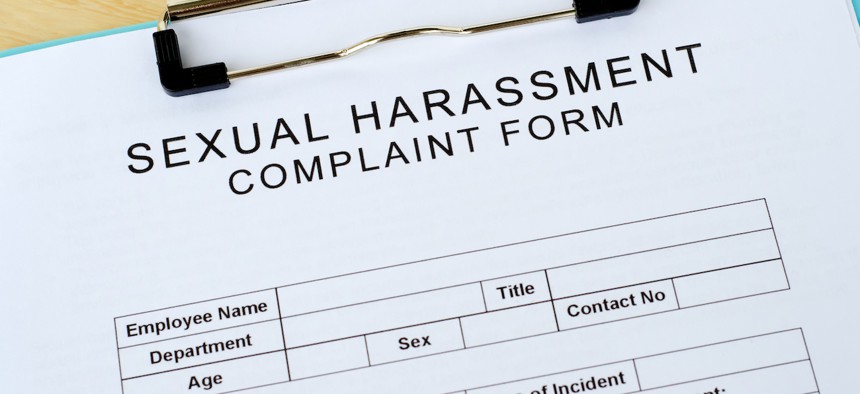
While the numbers trended down, the Merit Systems Protection Board noted the progress may be circumstantial. Nora Carol Photography/Getty Images
Fewer Federal Employees Are Reporting Sexual Harassment in the Workplace
At some agencies, the rates of harassment remain high.
Federal employees are reporting less sexual harassment in the workplace than they did five years prior, according to a new report that used data from 2021.
Among women, 17% federal civil servants said in a Merit Systems Protection Board survey that they experienced one of 12 forms of sexual harassment within the prior two years, compared to 21% in 2016. Overall, that rate dropped from 14.3% to 12.6%. In offices with “substantially more men” on the team, women 26% of women reported experiencing some for of sexual harassment.
While the numbers trended down, MSPB noted the progress may be circumstantial. The results could be attributed “success preventing sexual harassment as a result of agency efforts,” MSPB said, or it could be due to a “variety of other influences.” Most notably, employees began teleworking at far greater rates. The survey found agencies that teleworked less, meaning employees were in their normal facilities more often, had more reports of sexual harassment.
“More time will be needed to assess whether this shift represents a sustained improvement in the work environment due to changes in the behavior of management and employees—or whether it reflects the unique circumstances of the 2019-2021 time period,” MSPB said.
Employees were considered to have experienced sexual harassment if they checked one of 12 boxes on MSPB’s survey, with the boxes divided in three categories: unwelcome behaviors that disparage or objectify others based on their sex or gender, unwelcome behaviors of a sexual nature that are directed toward a person, and pressure or force to engage in sexual behavior.
Some areas that saw the greatest reductions in reported incidents included “unwelcome exposure to sexually oriented conversations,” which dropped from 9.5% of women to 5.7%, and “unwelcome invasion of personal space,” which went from 12.3% of women to 9%. Sexual assault and pressure for sexual favors stayed steady at around 0.5% and 1%, respectively.
In several categories, including inappropriate jokes, invasion of personal space and unwelcome looks or communications of a sexual nature, reported incidents ticked up among men. MSPB noted that could be a good sign as more men are feeling comfortable reporting such events.
The departments of State, Justice, Interior and Veterans Affairs had the highest reported levels of sexual harassment, at which at least 20% of women said they experienced such incidents in the prior two years.

MSPB stressed that agencies should be doubly committed to rooting out sexual harassment, as failing to do so can undermine their missions.
“This can occur in numerous ways, such as jeopardizing the ability to recruit and retain the most capable and diverse workforce, and not fully utilizing all the talent that they have on board,” MSPB said. “Further, the stress and dysfunction caused by sexual harassment can undermine the cohesion and productivity of work groups.”
Across the board, engagement scores at federal workplaces declined among victims of sexual harassment. Employees’ likelihood to recommend their agency as a good place to work, say they were treated with respect and report that cooperation exists in their workplace all dropped by 25% among those who experienced harassment.
MSPB noted that employees’ responses to being harassed are not improving. Incidents of simply avoiding the harasser have increased, while cases of reporting incidents through formal channels has decreased. The agency called it “concerning” that one-third of respondents said filing an Equal Employment Opportunity complaint only makes the matter worse. Those experiencing harassment are also much more likely to leave their agencies. One-in-three of victims said they were planning to move to a new organization or agency, compared to just 19% of those who were not harassed. One-in-five employees said their agency tolerates sexually charged comments and actions.
Prior to 2016, MSPB last conducted its survey in 1994. That year, 44% of women said they had experienced sexual harassment in the workplace in the previous two years. The issue appears less prevalent in federal agencies than the workforce writ large where, according to the Equal Employment Opportunity Commission, at least one-in-four women report experiencing sexual harassment.







